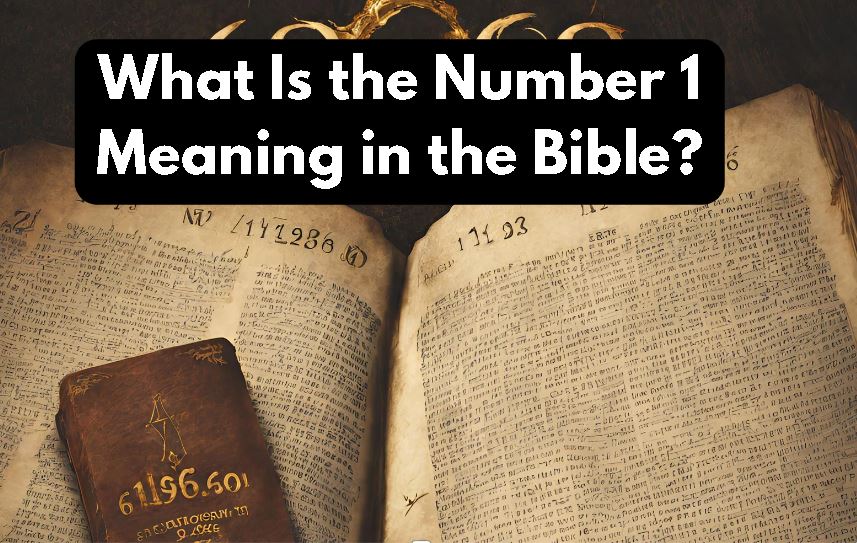The number 1 is used numerous times throughout the Bible, both literally and symbolically. But what is the deeper meaning and significance behind this number? Here are some of the most important associations of the number 1 in Scripture.
The One True God
One of the most fundamental meanings of 1 in the Bible is to convey the idea of the one and only God. This reflects God’s uniqueness and sovereignty as the sole supreme being. For example:
- “Hear, O Israel: The Lord our God, the Lord is one” (Deuteronomy 6:4). This passage, known as the Shema, affirms Israel’s faith in one true God.
- “I am the first and I am the last; apart from me there is no God” (Isaiah 44:6). Here God emphasizes that he alone is God, the first and eternal one.
So the number 1 signifies God’s exclusive status as the one Creator and Lord of all.
The Unity of God
In addition to emphasizing God’s oneness, the number 1 in Scripture also symbolizes the complete unity and integrity of God’s nature. Although God reveals himself in three persons – Father, Son, and Spirit – he remains one unified being. For example:
- “I and the Father are one” (John 10:30). Jesus claims unity with God the Father.
- “There is one body and one Spirit…one Lord, one faith, one baptism; one God and Father of all…” (Ephesians 4:4-6). This passage lists seven ones to represent the unity of God’s work in Christ and the church.
So the number 1 expresses the harmony, cohesion, and singularity of God’s essence.
The Uniqueness of Christ
Moving to Christology, the number 1 in the Bible focuses on Jesus as completely unique and unparalleled in his identity and work. Terms like “one mediator” and “one sacrifice” point to the exclusivity of Christ’s atoning role. For example:
- “For there is one God and one mediator between God and mankind, the man Christ Jesus” (1 Timothy 2:5). Jesus alone connects God and humanity.
- “By one sacrifice he has made perfect forever those who are being made holy” (Hebrews 10:14). Jesus’ single death was fully sufficient to cleanse from sin.
So the number 1 affirms the peerless nature of Jesus and the finality of his redeeming work on the cross. No one else measures up to the status and achievements of the one and only Son of God.
Number Symbolism in Revelation
The book of Revelation contains several significant uses of the number 1 pertaining to God’s absolute sovereignty and coming victory over all earthly powers:
- “The Lord God Almighty, ‘who is, and who was, and who is to come'” (Revelation 1:8). The “who is” affirms God’s eternal, unchanging nature and rule.
- “The kingdom of the world has become the kingdom of our Lord and of his Messiah, and he will reign for ever and ever” (Revelation 11:15). The one eternal God will establish his unified reign.
So in Revelation, the number 1 points forward to the culmination of history when God’s reign will be undisputedly supreme.
Additional Symbolic Uses of One
Beyond the main symbolic uses above, here are some additional examples of the number 1 in Scripture:
- Unity of believers: “There is one body and one Spirit” (Ephesians 4:4)
- Uniqueness of the church: Christ loves “the church…as Christ is the head of the church, his body, of which he is the Savior” (Ephesians 5:23).
- Foundational command: “Love the Lord your God with all your heart and with all your soul and with all your mind. This is the first and greatest commandment” (Matthew 22:37-38).
- Leadership principle: “Each assembly has only one president, one moderator, one lecture-reader” (Codex Justinianius). This reflected church governance structure.
So while one signifies uniqueness and singularity – especially pertaining to God himself – it also expresses unification among believers under the banner of the one Triune God.
Remember These Key Points
In closing, here are the major symbolic meanings behind the number 1 in Scripture:
- The one true and eternal God over all
- The complete unity and integrity of God’s nature
- The peerless identity and work of Jesus Christ
- God’s coming absolute sovereignty in Revelation
- Principles of harmony and accord among God’s people
By frequently highlighting the number 1, the Bible emphasizes these theological truths concerning God’s exclusive standing and soon-to-be-manifested rule over all creation. Pay attention whenever you encounter “one” in Scripture for a deeper insight into God’s being and purposes!
Conclusion: What Is the Number 1 Meaning
The number 1 echoes throughout Scripture, conveying essential truths about God’s identity and work. At its core, 1 signifies God’s uniqueness as the one and only eternal Creator. It also represents the complete unity and harmony of God across three persons – Father, Son, and Spirit.
When the Bible applies 1 to Christ, it spotlights his unparalleled nature as the sole mediator between God and humanity. Jesus’ exclusive status as God’s Son is emphasized through his one-time sacrifice for sins. Moving to Revelation, the number 1 points ahead to God’s coming victory and undisputed reign over all competing earthly powers.
While underscoring God’s singularity, 1 also expresses ideals of harmony and accord among believers united under one Lord. So this symbolic number teaches crucial theology about God’s exclusive divinity, his triune integrity, Christ’s peerless identity, and the eventual establishment of his eternal kingdom. Whenever we see 1 in Scripture, we should pause to reflect on these fundamental truths encapsulated in a single number.
